http://www.geekcastradio.com/
Were they provides plenty of podcasts on a regular basic, on a bunch of subjects, you'd be surprised if you go through how detailed they get. But you can track of them on Social Media as well, at the addresses below.
https://www.facebook.com/GeekCastRadioNetwork/
https://twitter.com/GeekCastRadio
So, far I've revealed half of my ballot, (And I cannot express this enough, I'm revealing MY BALLOT, and MY BALLOT ONLY, this is not the results of the poll, I am simply one voter, revealing his ballot, after the results have been counted/turned in, but before the results have been revealed on their website and podcast, and I will be promoting their results when they're finally listed.) and explain why I voted for who and a little bit of my voting process. Remember, there's no standard her, this is TOP 100 VILLAINS, period. This can literally include anything, from pretty much every medium of literature you can think of, not to mention characters who've appeared in multiple and in some cases several literary mediums. You can find the complete explanation and Part I, at this link below:
http://davidbaruffi.blogspot.com/2017/10/my-top-100-villains-ballot-100-51-for.html
Aka, my previous blogpost. Basically though, I was trying my damnedest to determine what were in fact the biggest and most important Villains in the history of literature, and my seminal criteria. It certainly wasn't the only criteria I had, and nevermind the fact that "Villain" can be subjective, the word "Top" is not explained either.
So, how am I doing so far? Well, before I restart the countdown from #50, all the way to my number one choice, (And it might surprise you) let's go back who I've listed so far....
TOP 100 VILLIANS (MY BALLOT)
100. Daniel Plainview ("There Will Be Blood", 2007)
99. Marcy Rhoades D'Arcy ("Married... with Children", 1987)
98. Boris Badenov & Natasha Fatale (Rocky and His Friends aka "The Rocky and Show", 1959)
97. Estella Havisham ("Great Expectations", 1860)
96. King Joffrey Barantheon ("A Game of Thrones", 1996)
95. Margaret White ("Carrie", 1974)
94. Max Cady ("The Executioners", 1957)
93. Gordon Gekko ("Wall Street", 1987)
92. Fernand Mondego ("The Count of Monte Cristo, 1844)
91. Cody Jarrett ("White Heat", 1944)
90. Louie De Palma ("Taxi", 1978)
89. Lady Eboshi ("Princess Mononoke", 1997)
88. Roger 'Verbal' Kint ("The Usual Suspects", 1995)
87. Griffin Mill ("The Player", 1988)
86. Anton Chigurh ("No Country for Old Men", 2005)
85. Maj. Frank Burns ("MASH: A Novel About Three Army Doctors", 1968)
84. The Grinch ("The Hoobub and the Grinch", 1955)
83. Gregory Anton ("Gaslight", 1944)
82. Mrs. Eleanor Iselin ("The Manchurian Candidate", 1959)
81. Carmen (Carmen, 1845)
80. Elmer Fudd ("Elmer's Candid Camera", 1940)
79. SS Col. Hans Landa ("Inglourious Basterds", 2009)
78. Napoleon ("Animal Farm", 1945)
77. Noah Cross ("Chinatown", 1974)
76. Khan Noonien Singh ("Star Trek", 1967)
75. Monseigneur Claude Frollo ("The Hunchback of Notre Dame", 1831)
74. Cesar Soubeyran dit Le Papet ("L'eau des Collines" aka "The Water on the Hills", 1952)
73. Marquise de Merteuil ("Dangerous Liaisons", 1782)
72. Rev. Harry Powell ("The Night of the Hunter", 1953)
71. Alex Forrest ("Fatal Attraction", 1987)
70. MacBeth ("The Tragedy of MacBeth", 1606?)
69. The Evil Queen (German Fairy Tale, "Little Snow White", 1812)
68. Eddie Haskell ("Leave It to Beaver", 1957)
67. Mark Lewis ("Peeping Tom", 1960)
66. The Phantom ("The Phantom of the Opera", 1909)
65. Bruno Anthony ("Strangers on a Train", 1950)
64. C. Montgomery Burns ("The Simpsons", 1989)
63. The Hag aka The Witch (German folklore, "Hansel & Gretel", 1812)
62. Tony Soprano ("The Sopranos", 1999)
61. Regan MacNeil ("The Exorcist", 1971)
60. Phyllis Dietrichsen ("Double Indemnity", 1944)
59. Norma Desmond ("Sunset Boulevard", 1950)
58. Vince McMahon ("World Wide Wrestling Federeration: All-Star Wrestling", 1971)
57. The Joker ("Batman", 1940)
56. Asami Yamazaki ("Audition", 1997)
55. Hans Beckert ("M", 1931)
54. Sweeney Todd ("The String of Pearls: A Romance", 1946)
53. The One-Armed Man ("The Fugitive", 1963)
52. Captain Ahab ("Moby Dick", 1851)
51. Dr. Zachary Smith ("Lost in Space", 1965)
So, with 50 down, and 50 to go, where do we start off with the rest. Well, let's start out with a bang. Actually that's a bad choice of words, let's not; this one's a pedophile.
50. Humbert Humbert ("Lolita", 1955)

I can see an argument to be made that perhaps there are some, more villainous characters in the world of "Lolita", Quilly for instance, that I could've made a better argument for, but let's be clear, Humbert Humbert, it's not subjective. He's a pedophile. It's not like Dolores, or Lolita, which people forget is a nickname for the character, that he gives her, it's not like she's 12 going on 18, or that it's a one-time thing, he's distinctly only attracted to girls of a certain age, and he has been in the past and is now. And whatever he's doing, it's still, in the forefront of his mind that he's doing it. Basically, what he's doing, essentially, is trying his to keep Lolita away from other pedophiles, and convince her that she should be with him, 'cause he's the good pedophile to be with. The sick thing is, that, that's probably not an inaccurate analysis of just how some pedophiles think and behave.
So, from a pedophile to, age-wise the youngest character on my list. You might have noticed, both on this list, and in general with me, that when it comes to people or trends that I am critical of, one behavior I generally take offense, is something I call the "Big Fish, Small Pond", people; people in both real life and in fiction, who take pride in themselves and powerful, but on a small scale, but use that power, or at least try to, to control others. That to me, is probably the worst, most pathetic, despicable form of human behavior. That kind of pettiness, doesn't ring well with me.
49. Anjelica Pickles ("Rugrats", 1991)
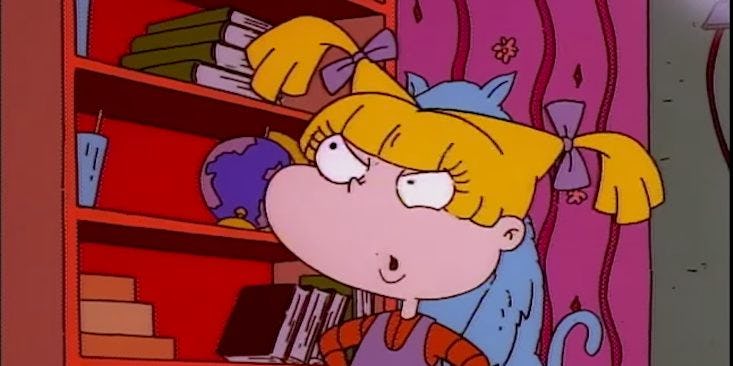
So yeah, forget everything else about her being a spoiled brat, and all that entails, her big claim to power and dominance, is that she's a three-year old, and everyone else around her, is only, at the most, two. That means, that she thinks she can control everybody and have final say over everyone else. Yeah, I don't care it she's only three, what a fucking bitch! This has got to be the ultimate example of big fish, small pond syndrome.
48. Henry ("Henry: Portrait of a Serial Killer", 1990)

Henry, is based on a serial killer named Henry Lee Lucas, who at one point claimed to have murder 600 people. Most of claims were false, but he did murder quite a few people, along with compatriot Ottis Toole. The movie, "Henry: Portrait of a Serial Killer" was actually made in 1985, and didn't get a theatrical run, until 1990, and even then, it was an unrated run, and it's one of the most disturbing and violent movies ever made. Henry is smart, he is a sociopath, but the real essence of him, is the complete lack of caring in his violence. Most serial killers are patterned and ritualistic, Henry just kills indiscriminately 'cause he wants to kill somebody, and you hang around him long enough, even if you're a friend or even a lover, you're gonna end up killed by him. You can almost claim that structurally, the story about a murder addiction, but really it's about a natural instinct to kill.
47. Erica Kane ("All My Children", 1970)

Oh, I love this trivia question, her full name is, Erica Kane-Martin-Brent-Cudahy-Chandler-Roy-Roy-Montgomery-Montgomery-Chandler-Marick-Marick-Montgomery. In a lot of television analysis, and history, we tend to just simply ignore daytime soap operas, especially nowadays when the genre has practically died, but that's such bullshit, 'cause you go back, and you'd realize that daytime, was like, in some cases, light years ahead of what network television was doing. I mean, how many procedurals are there now; they're all soap operas on TV now, they're just called primetime drama series, 'cause most of them don't want to admit that their structure is stolen from soap opera. Agnes Nixon, is one fo the most underrated and important people in the history of television, and her greatest creation is Erica Kane. I might argue that she was the first true bitch of television. She's upper class, she's want more fame and riches and will do anything to get it. She's the ultimate abandoned little daddy's girl, so she's always depressed to be the center of attention, and then when she gets it, she's not sure what to do with it. She love and fame and money, and she gets all those things, but she only wants them in the abstract. It's partially astonishing that she managed to sympathetic, but that's partially 'cause we had 41 years of following her around.
45. Freddy Krueger ("A Nightmare on Elm Street", 1984)

I don't have a lot of horror villains on the list, like modern slasher characters villains, I don't think they're as interesting as some believe. A big exception to that however, is Freddy Krueger, 'cause, sure he's a character. He's still a vicious child murderer, but he's a more elaborate character than that, although still, to me, the thing's really intriguing about Freddy is that, he attacks and kills you, while you're dreaming. While you're asleep. Dreams are supposed to be the one place, where, no matter what happens, in your dreams, you're safe, 'cause you'll wake up and everything's back to normal, but the fact that he's so powerful, that he can kill you in your dreams and then you'll be dead; that's truly terrifying to me. Dreams are your nightly break from the horrors of reality, not, where the battle for life and death should take place.
45. King Kong ("King Kong", 1993)

King Kong, is the great tragic-villain of film. He's an ape out of time and out of place, but you know, you feel sorry for him. He doesn't know any better, he doesn't know what he does or why he's doing it, but he can't help himself. He doesn't want to destroy or hurt others, but he does. He's kinda like Frankenstein's Monster, except for the fact that, there's this, inter-species love aspect to him, that's a bit weird and disturbing; I don't quite get what the whole deal was, with that idea, human woman being so enchanting and beautiful that it,...- well, I guess it's "Beauty and the Beast", but it doesn't tame the beast so much as agitates him, and makes him more emotional and more violent. There's some really disturbing aspects to "King Kong", that, probably have more to say about us, and how we designed and created him as opposed to, how he is.
44. Don Lope de Aguirre ("Aguirre, the Wrath of God", 1972)

This was the other real-life character I put on the list. Lope de Aguiree, was indeed a conquistador who traveled to South America searching for Gold, and died doing it, but he also mutinied his troop, and everybody under his care, was killed by him, or by the conditions, and he seemed to be incredibly reckless and self-centered, and of course, convinced, there was a City of Gold out there and he was also, a bit delusional. They called him "El Loco", as in "The Madman". That said, there's very little documentation about the journey itself. Werner Herzog's great movie "Aguirre, the Wrath of God", first of all, Herzog's crazy, so we're really on the Amazon, again, (Or technically for the first time) and Klaus Kinski, plays this madman, as quite vehement and violent mad. We're already in this surreal world, where we have man-servants carrying some people over rocks and mountain, and carrying over dirt. We're seeing this, journey, led by a murderous psychopath, and we know it's not gonna go well, but how bad it gets is just surreal. That shot at the end, he's the last survivor of the company, and he's still insisting on going forward, as his raft is overtaken by monkeys....- that's probably not something that happened, but that image, to get that crazy, to me, that's why I can justify this one. The character that Herzog created of Aguirre is a little too distinct to ignore; I can't imagine, even with the knowledge that he was inspired by the few writings and documents of the time, that he was a representative of the real person.
43. Frankenstein's Monster ("Frankenstein or, the Modern Prometheus", 1818)

Speaking of Frankenstein's Monster,... he made the list too. I think you can make an argument for Dr. Frankenstein to be on the list instead, but you know, his intentions were good. He was doing something in the interest of science and in the interest trying to do a good thing, takes something that's dead, and bring it back to life. I can't really blame him, for the result that occurred. That's the trouble with science sometimes. Again, you feel sympathy for the Monster, he is made out of parts of man, but he's a monster. He's not supposed to exist, he's not fit for the world. He's not somebody you want to destroy, but if you don't destroy him, then it's a disaster. That nightmare scenario is the big fear of science and it's what creates some terrifying villains in literature. There's been a lot of Frankenstein stories, out there, where there's a character that's just pure destruction, and no matter how smart of wit you have, you can't talk him off his problems, you've just got to defeat him. The character who tries but through no fault of his own, can't. That's always powerful.
42. The Shark ("Jaws", 1974)

I'm just gonna throw this out there, that, we've probably, never not been afraid of sharks. Like, even before "Jaws", I can't imagine that we were ever like, "Oh, cool, there's sharks let's swim with them!" We were always afraid of sharks. I think, if anything, we just got more knowledgeable about them from the movies and the book, and also, just finally got a visual representation of those fears. Like, something we can all kinda go, "Holy fuck, that's scary!" We're genuinely afraid and fascinated by sharks, and it's because of The Shark from "Jaws". Which is actually fascinating, 'cause he's not in the movie much, at least not the first one. Which is fine, we would really see a shark attacking us, it was always going to be, the effect of the shark that we'd notice. They're underwater, they're stealth, they come from underneath, from the depths of the Sea, to pull us in. I know people who still go in the Ocean.
41. Travis Bickle ("Taxi Driver", 1976)

It's very clear, in "The Searchers", that John Wayne's Ethan Edwards character, might be very flawed, but that ultimately, he's supposed to be the hero. when that story got re-imagined by Paul Schrader and Martin Scorsese, in the modern world of the 1970s, it's much more obvious that he's not. He's somebody who's, obsessive to the point of insanity. That he's somebody who's looking for that time, an opportunity to explode. And he is looking for it, you know. He's a Taxi Driver, and the swamps of New York City that he drove through, were historically noteworthy at the time, but he doesn't have to be driving there. He wants to get his buttons pushed; he wants to find an excuse, he's calculative. He might not admit that to himself, but he fucking practices it in front of the mirror. I think it's the fact, that it is so realistic, that we know people are capable of this transformation and are just a few bad ideas and turn the wrong way on some people, and who knows what they might do. It might be for good, Travis Bickle might be the good guy, but he also might be the guy that shoots up a concert.
So, Travis Bickle is a villain, who in the right circumstances, might be the hero, but, it's still situational at best. Can anybody out there, be both the hero and the villain at the same time? Sure there's antiheroes, but, being both is really difficult.
40. Dexter Morgan ("Darkly Dreaming Dexter", 2004)

Dexter is, by far, one of the most psychologically interesting and compelling characters in television history. He is, this, serial killer, who, essentially is hyper-aware that he is truly evil, but, has been taught and continues to behave, for the most part, in a way, that's honorable, heroic even. And it's a real nature vs. nurture complex with him, that's, constantly battling with each other. Meanwhile, he's trying to act normal or heroic depending on the situation, and meanwhile, he's also trying to find his next kill. He more he tries, to only be righteous the worst it gets and the more people close to him get hurt. The tragedy of Dexter Morgan, is that, he doesn't want to be the hero, he needs to be the hero, specifically so he can remain the villain. He's doing the selfless thing for the most selfish of reasons, and he knows that that's the only way it can work.
39. Lady MacBeth ("The Tragedy of MacBeth", 1606?)
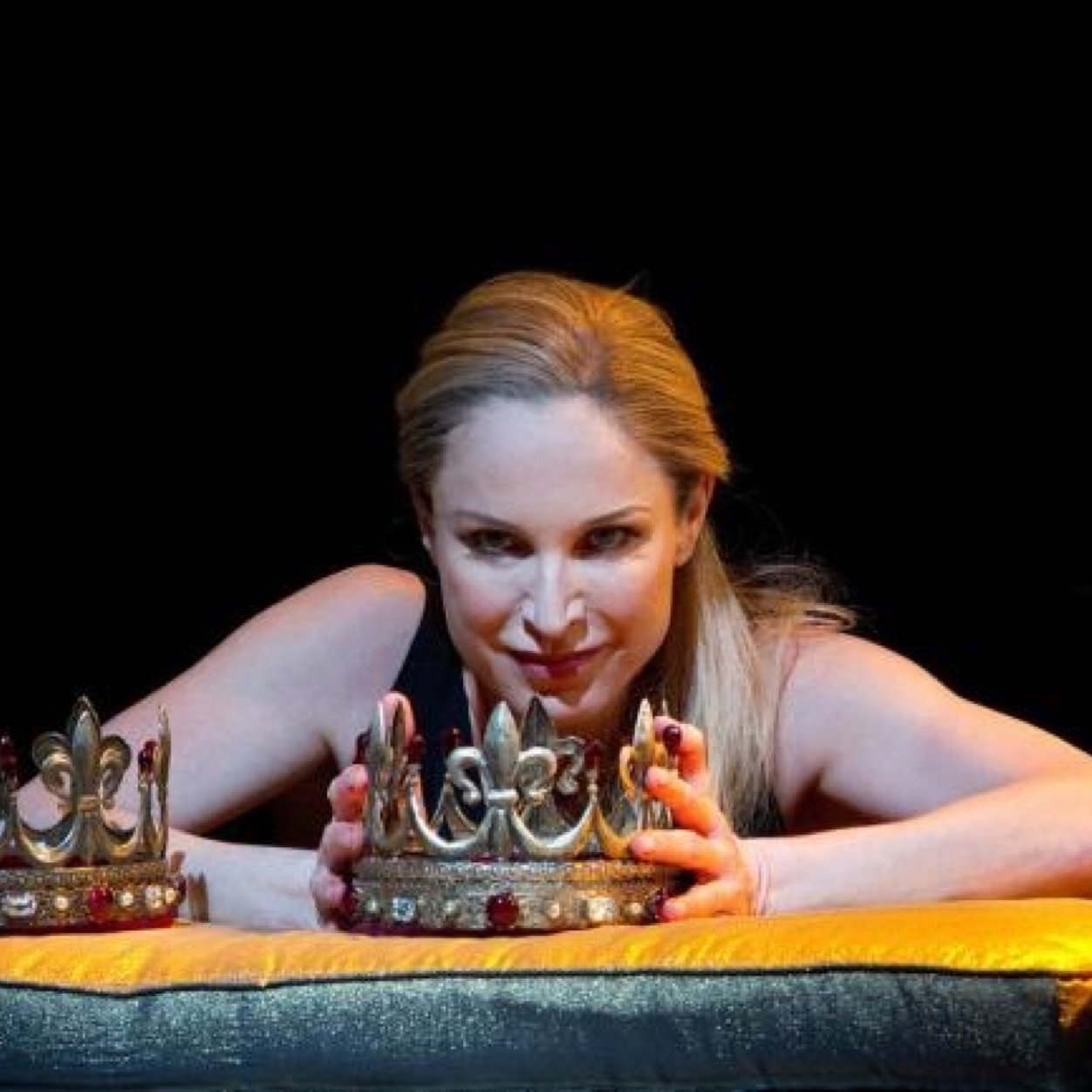
The only piece of literature that originated two villains on my ballot is "MacBeth", and of course, Lady MacBeth is the one everybody references. I think it's a little more complex in terms of just, how important she is to the events of the story, but it's clear, she has influence. She is the person you think of as the woman behind the man, of course I might argue that represents, you know, a bigger issue with society, that the women is behind the throne, and in the throne, but we'll let that slide. In many ways that makes her much worst. She's behind the scenes pulling the strings, convincing people to do things that they might not have done elsewise, and then she feel guilty about it when it doesn't go her way! That's the most abrasive stuff, "Out damn spot!" No, you created the spot, live with it, and of course, she chooses not to, makes him go on. The worst kind of power hungry you know, wants other to get powerful so shel'll be more powerful.
38. Annie Wilkes ("Misery", 1987)

As weird as this will sound, Once upon a time, I had a groupie. She was fun, she freaked me out a bit, it was in high school. Making out with her, in hindsight, was probably misleading to her. But, still, you've gotta be, skeptical of people who really like your work. I'm always skeptical of fans, they start to expect or want things from the people they're fans of, and if they don't get it, they can get angry, 'cause they have this image of you, and if they don't conform to that image, they can feel betrayed. Which is of course, nonsence, the artist isn't beholden to the fans, but you know, try explaining that to a madwoman with an ax. Maybe this is a creator's perspective, but yeah, Annie Wilkes, is a lot of other creator's worst nightmares.
37. Tom Ripley ("The Talented Mr. Ripley", 1955)
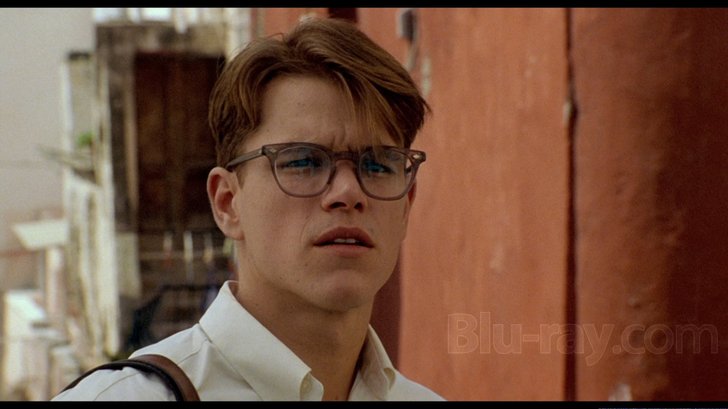
I think people mostly know "The Talented Mr. Ripley" film, which was actually the second adaptation of that particular novel, but Patricia Highsmith's character of Tom Ripley, is one of the most fascinating in all of modern literature, and has been adapted, several times to movies. Highsmith's main themes usually involved human nature and identity, and Ripley, is one of the most intriguing characters out there. He's a con man, he's a serial killer, he's completely amoral, he's probably gay, maybe bisexual, but that's presuming that he has any sexual feelings to people at all, more than any of that he's a psychopath, who has no guilt, little regret, about what happens to the people around him, and yet, he loves, the upper class lifestyle and manages to thrive in it. He's great at acting like he cares about people and things. He has one positive trait, that keeps him interesting, and that is that he has a fascination with humanity; it's like a hobby of his to observe it, 'cause he's incapable of experiencing or understanding it himself. That's why he's survived many books and adaptations and continues to be a fascination to many.
36. King Claudius ("The Tragedy of Hamlet, Prince of Denmark", 1599?)

We never, do, like hear Claudius's side of the story, you know? I mean, Hamlet's clearly pissed. Sure, he killed his brother and married his wife to become King, pretty damn quickly too, but for all we know, the King might've deserved it. He might be saving the kingdom, and now this young punk "Hamlet" is annoyed and getting in the way. so he does everything to try to distract, but it still ultimately doesn't work. It's possible. But the play is, more or less, from Hamlet's perspective, and to him, he is this monstrous Uncle, who's so jealous and power-hungry that he orchestrates this elaborate coupe to take over the throne, and you know, which screws over Hamlet, twice, 'cause first he kills his father, then he takes his place in line for throne. He must've known that Hamlet would be pissed, this couldn't have shocked him, you know? He sets up spies, he makes him go crazy, or at least pretend to, I mean, seriously how many deaths can you contribute to Claudius, that we probably misconstrued as caused by Hamlet. It is the greatest play of all-time, specifically because of how amazingly versatile it is, but not just Hamlet, that's on nearly every character, Claudius as well.
35. The Wolf (European folklore; "Little Red Riding Hood", 1697)

The origins of "Little Red Riding Hood", are probably the sketchiest of any of story I've selected for this list, some date it to 9th Century France, some to 10th Century Italy, the story, on some level like "Hansel & Gretel" has been around forever but the known printed version comes from Charles Perrault's second edition of "Stories or Fairy Tales from Past Times with Morals", which is not only a very famous edition of that book, but that's the collection of stories that we generally regard and consider to be, the tales that we attribute to Mother Goose. The Wolf, character hasn't always been the villain, but at some point, from Aesop to Mother Goose to Grimm, to Joseph Jacobs, the creator of the "The Three Little Pigs", but as far as I can tell, the earliest narrative involving The Wolf is "Little Red Riding Hood", and it's the one where he's by far the most villainous. Even in the versions where he's the most sympathetic, he still, trying to trick a little girl, so he can eat her!
34. Cruella de Vil ("The Hundred and One Dalmatians", 1956)

If Cruella de Vil's not your favorite Disney villain, then I don't quite understand you. It so, comes out of nowhere, when you really think about it. Even in Kid's stories, this must've been an odd book too, to begin with; there's more psychopathic material in the book. In the movies, she's just this evil rich fashionista bitch, who, will go to extreme, ridiculous lengths for a coat. Not even a particularly good one necessarily. It's so out there, that you kinda have to tilt your head at it? You don't want to marry the Prince, or kill the Princess, or rule the Universe, no, she''s doing this for a fur coat! For that, she's kidnapping and killing puppies?! Like, it so hurts your head when you think about it; just-, like, I can't even tell if it's truly vanity; I can't imagine that coat's going to be that well-praised. I think she just want to prove she's dominant over puppies, by wearing them. You gotta love a villain, that can come of leftfield like that, and truly be that despicable and villainous. You know other villains think she's entirely fucked up, right?
I mentioned before that I decided not to have Zombies on the list. I know-, I probably could've but, I just-, I just never associate zombies as being a great villain. I mean, there's easy to kill, sure there's a lot of them, but their mindless, leaderless drones, I feel like if you ignored half the time, they wouldn't do anything. If you ask me, in order to be a good enough villain to make list, as a group, they need to be a little more, collective.
33. Borg ("Star Trek: The Next Generation", 1989)

Yeah, these aren't just mindless drones, there's clearly somebody or some-thing, in control. It touches on so many fears, they're computer and microchip-base, so they're a technology parable, there's a bunch of them, and they're gaining in number as they force assimilate, so there's that parable, they don't just kill, though, they collect and encompass your information, your history, so that they're more knowledgeable and they become stronger as they go. They adjust to you, you kill, they find out how, and you can't kill that one the same way. This is the supervillain of the "Star Trek" franchise, that the franchise needed. It's a direct challenge to everything they hold dear, and they're literally the thing to circumvents everything they fight on for. When they say "resistance is futile", it's the one time you will ever hear that phrase and think, "Yeah, it might actually be."
32. Long John Silver ("Treasure Island", 1883)
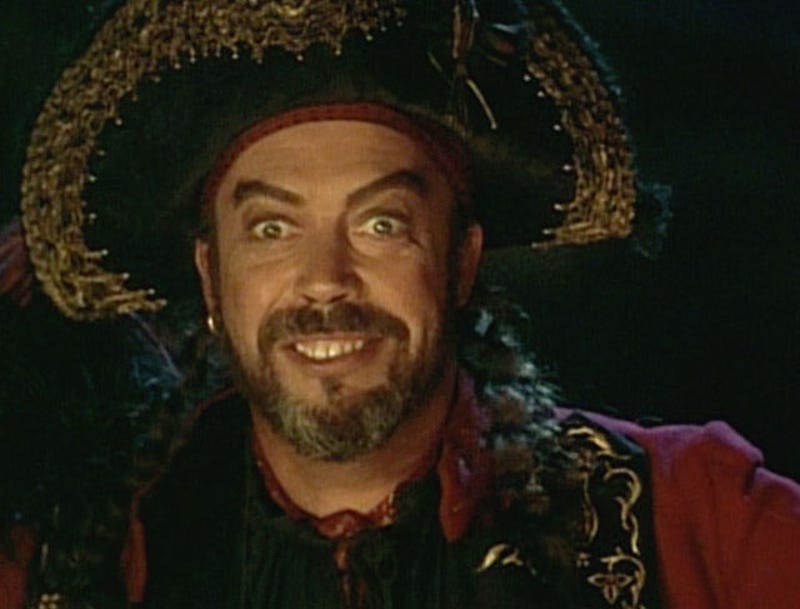
I think if you get an image of a pirate in your mind, it's probably a delineation or variant of Long John Silver. I'm not sure exactly why he caught on; I think it must've been the surprise of him, 'cause if you read the book, without it being ruined for you, you don't necessarily peg him, as the villain. He's quite a likable character; I think a lot of people might not even be aware that he's the villain. He has a legit motive too, he's got a claim to the treasure, that's somewhat legitimate; it's not out of nowhere. And I don't think he's deceiving Jim Hawkins either, when he befriends him; he might not be trying to get him to join his side. He's by no means, the most evil pirate in literature or real life, he's not even close, but he is the most compelling, and the fact that he is so complex means that he very much could be the worst and most evil one there is. He's smart enough, he's charismatic enough, he's got people willing to be on his side; he could've been the next Blackbeard or whoever, if that's what he desired.
31. Vic Mackey ("The Shield", 2002)

The best description I've ever heard of Vic Mackey is that he's a guy wearing a black hat who thinks he's got a white hat on. I don't know if he's the worst nightmare of what we think a cop, particularly a corrupt cop is, but he's up there. What always fascinated me, with him, and several other characters and people who are this corrupt, and use, their shield as protection, is that, how often if they took one second to think about it, they wouldn't be in these messes, 'cause most of it's their own making. His ideas and plans, usually go awry and he spends all his time cleaning and covering up, instead of, just simply, being a cop, which probably would've worked better most of the time. It's another, Machiavellian big fish, small pond, thing, he thinks that he can control everything 'cause of his status, and that allows him to do everything and anything he wants. That it's all for the greater good, and of course, he loses everything by the end. I've always had a hard time watching "The Shield" personally, and it's not that it's a bad show, it's a great series, but-, I've always thought the best kind of corruption out there is when it looks like in every other aspect, that you're abiding by the law and rules as closely as you can. Old Boss Getts, approach, and you know, as smart he is and corrupt as he is, there's no thinking that deeply with Vic Mackey. There's no subtlety, there's no nuance, he's not even necessarily a good cop, he's very good at being a villain, who uses his status as a cop to get out the shit he's in. He may claim it's for the best, for him and those around him, but it was never for the best. He's a brutal, short-sighted, narcissist who found that he can get all his anger and frustration out by becoming a cop and being able to screw those he thought we're lesser than him.
30. Wicked/Evil Stepmother (Origins unknown, "Cinderella", ?)

I don't think people realize just, how big and important the story of "Cinderella" is, to the world. For most of us, I think it's just, a fairy tale, for much of the world, it's "the" fairy tale. If you come up with a version of "Cinderella" it's going to strike a cord somewhere. Come from nothing and less than nothing, and inevitably end up marrying the Prince and inevitably finding eternal happiness; that story, will never die. Neither will the idea of the Evil Stepmother, which actually predates "Cinderella" most likely; it's even more debatable where that origin came from, but you get why it remains so powerful. There's so many negative narratives, of the woman, coming in, in replace of the original mother, which is what I really suspect this trope comes from. Coming in, marrying your Dad, this person, becoming a member of the family, from completely outside of it, beforehand. You have to think there's some evil intentions, and when those intentions get revealed, you know.... Something happens, and if you're a kid, you're stuck with this person. You don't know anything, you can't escape or go out in the world. This person controls you. That's why I think the Stepmother, has continued to hold so deeply in the Cinderella myth, it's wonderful to go from nothing to happinees, but you need that obstacles that gave you nothing and shoved you to rock bottom to begin with.
29. Anakin "Darth Vader" Skywalker ("Star Wars", 1977)
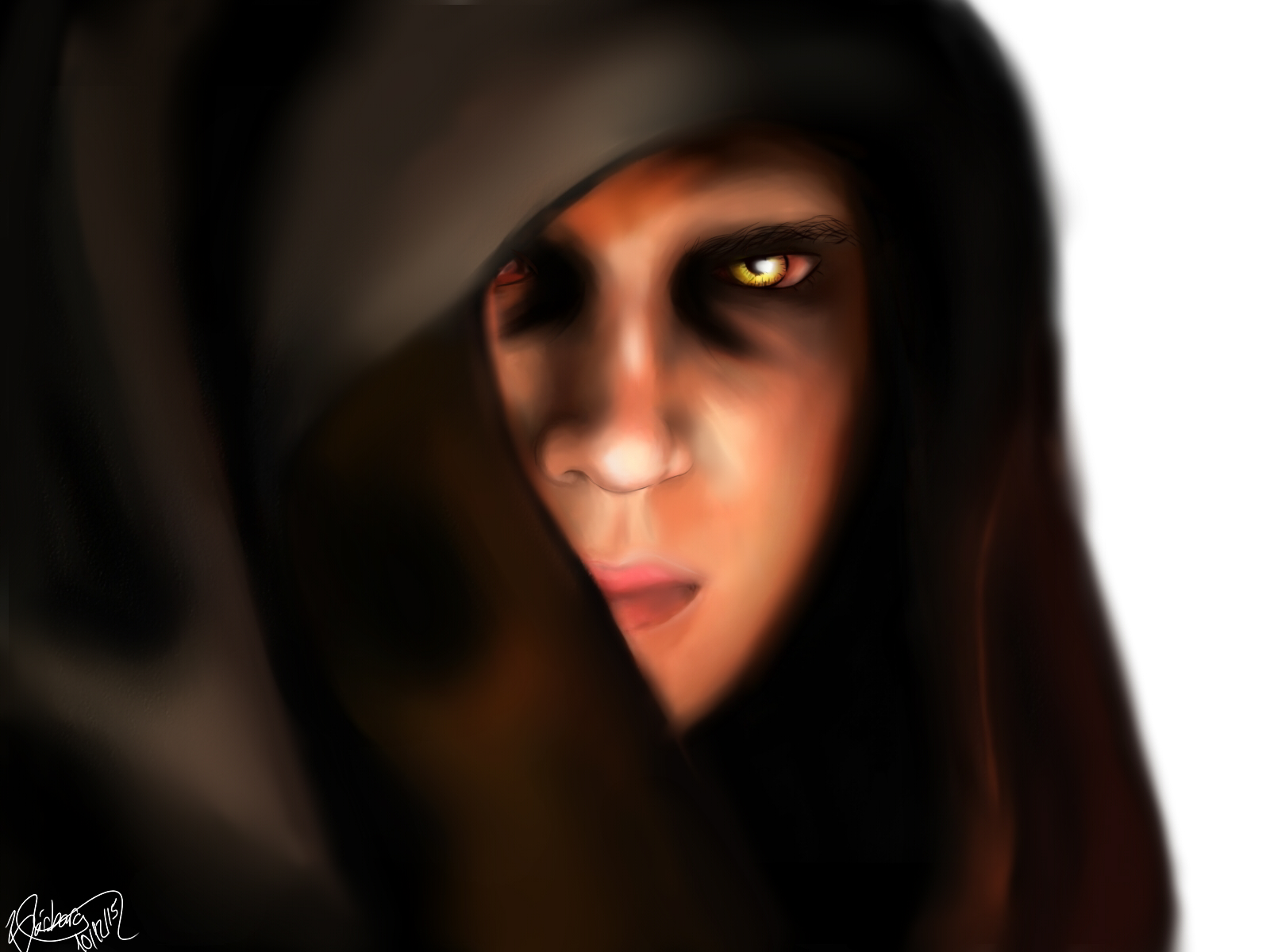
No, I'm not calling it "A New Hope", those people can go fuck themselves. It's sorta funny, 'cause I think what was always so interesting is how he seemed to be apparent epitome of evil; he's dressed in black, he's all dark side, he's part cyborg, he breathes with a machine,...- there's in him that's particularly good, plus he's all powerful. He's the one who mastered the powers that everyone else, mostly just hopes and prays to get, but he's the one who took advantage of them and used them for evil. I think the fact that, there's much subsequent literature on Vader since, the first movie, and the big reveal at the end of "The Empire Strikes Back", that it actually becomes more difficult to think of him as a great villain these days. It doesn't help for me, that I never thought "Star Wars" that deep to begin with, but the compelling aspect of him, is the mystery surrounding him, and the more that mystery, gets written and re-written, sure, he's become a more tragic-villain, a different kind of villain, but I don't think it really helps him necessarily.
28. Harry Lime ("The Third Man", 1949)
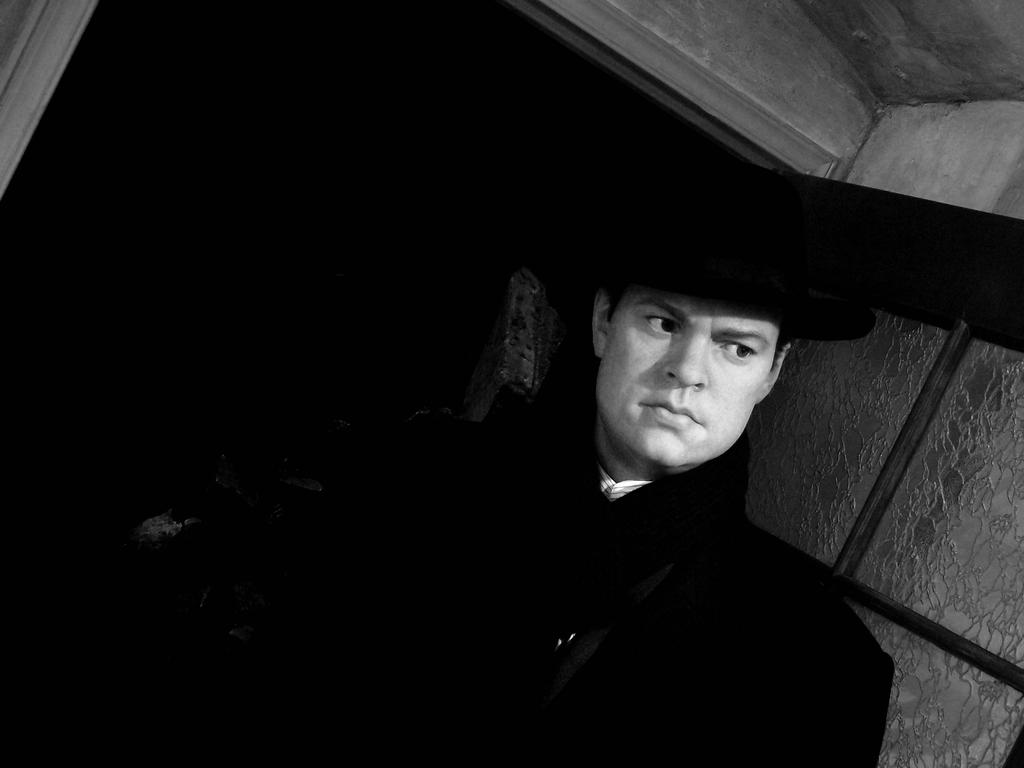
Harry Lime isn't onscreen too long in "The Third Man", in fact, we don't even think he's alive for most of the movie. This is the premiere golden age of cinema, movie villain. He's in the shadows, he escapes through the sewers, he works in the black market, "The Third Man" is one of the great film noirs of all-time, and arguably the best British film ever made. He's also a philosophically interesting villains, 'cause he's not necessarily wrong in what he's doing. The great scene, from the ferris wheel, asking whether or not it would matter if one of those ants were to die. And keep in mind, this is a vicious despicable man, who steals and dilutes penicillin and sells it to children's hospital, while he's taking advantage of the post-war blockades in Eastern Europe. And yet, he probably makes the best argument for criminal activity ever made. Even after he's caught and dead, he gets the girl at the end! He's captivating, he's compelling, he's not stupid, he's not wrong, and yet, he's doing some of the vile things you can think of to do as a criminal. Even by black market standards.
27. Shylock ("The Merchant of Venice", 1596?)
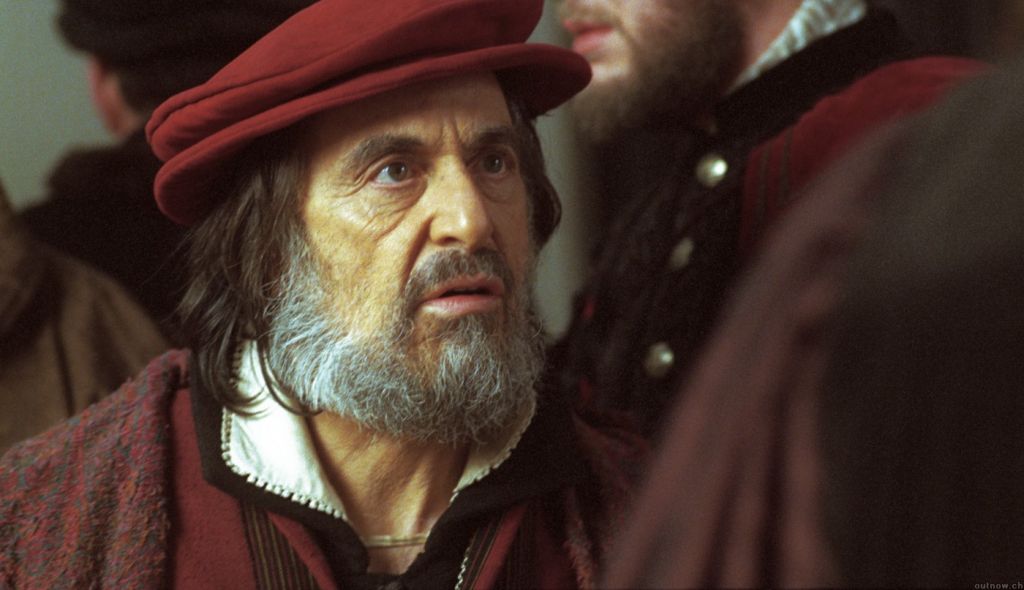
For about a couple centuries after the play debuted, Shylock was usually portrayed as a joke, a very hammy over-the-top character, and that makes sense in the text, and "The Merchant of Venice" is technically one of Shakespeare comedies. That said, from a more modern perspective, there's not as much comedy as it seems. Shylock, is Jewish, which, at any time period, isn't particularly good, but at this point in time, he's particular looked upon as an outsider, but he's rich, and he's a money-lender; he's a loan shark. He then, demands a pound of flesh from Antonio, who he's lending money to, even though, he's literally spat on him. His motives, make sense, he's been wronged by this guy, who then comes begging for money from him, but that's when his pride and greed get in the way, and it goes way too far. On top of that, his daughter runs the guy's son, converts to Christianity for him. This is the just villain, who goes way too far, and it costs him. There's so many levels, there's classism, there's racism, there's pride, there's revenge, there's the fallen,... there's a quite more in the play than it seems on the surface. Oh, and most people, think the pound of flesh represents his balls, so there's that, too, he's literally demanding that this man stake his manhood on paying him back. You feel sympathy for him, but then at a certain point, you know, he loses it.
Speaking of, going a little bit too far, we've come to the oldest character, and-eh, you guys remember when I said something about eliminating mythology and religious characters. Um, well, I didn't quite, do that either entirely, either, That said, I don't think anybody was using Eurypides has a religious text, and I don't think anybody prayed for or to this woman, so, I think I'm enough in the clear.
26. Medea ("Medea", 431 B.C.)
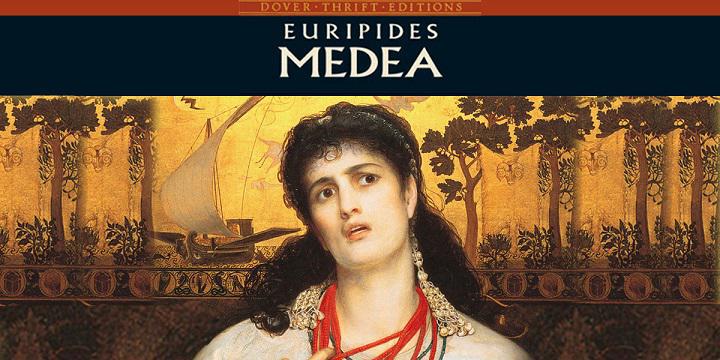
So, what do you do, when your husband decides to leave you? I don't know, go out and get laid, maybe cry at a friend's maybe attack him, and scream and yell and insist half their stuff for their divorce. Um, Medea, thought of something else to.... Again, she wasn't necessarily unjustified, but killing and then your kids and serving them to your husband, that's a bit of a stretch. I guess, if you're going down, you have to bring your kids with ya, but... yikes. There's a don't-leave-your-wife morality tale for you.
25. Capt. James Hook ("Peter Pan, or the Boy Who Wouldn't Grow Up", 1904)
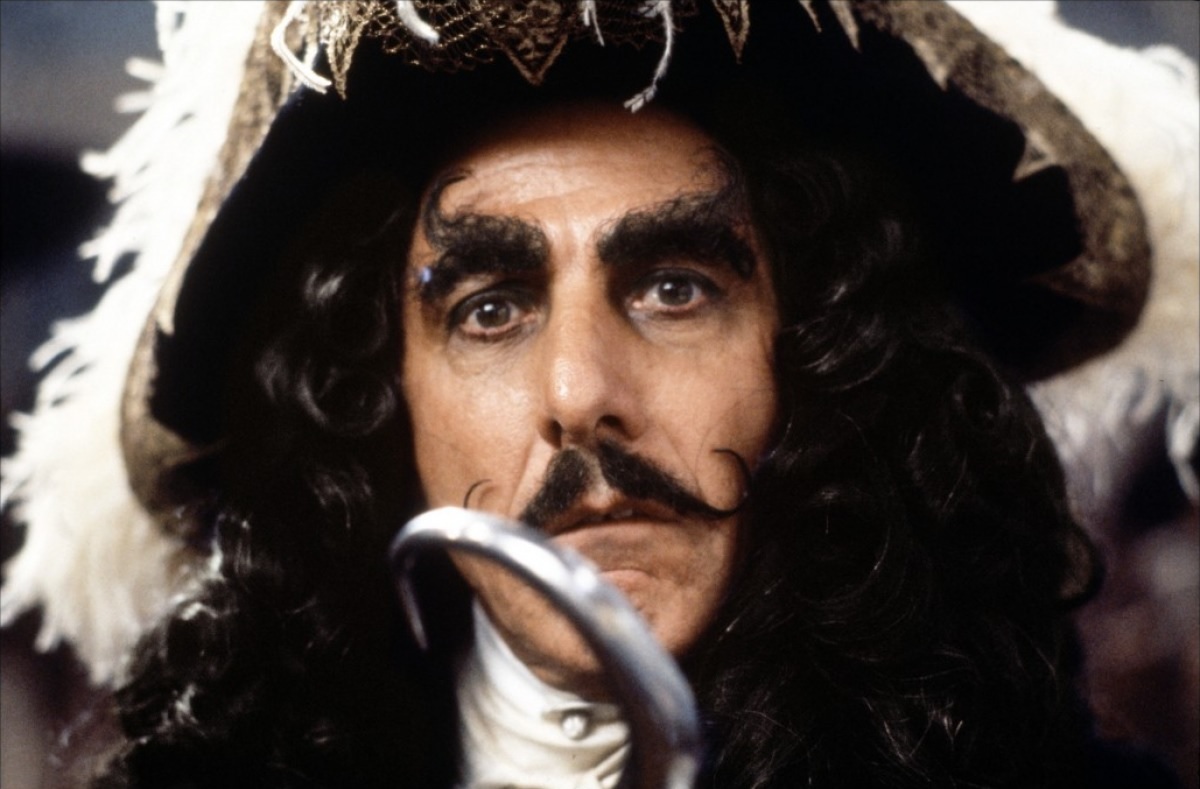
There's a lot of Ahab in Capt. Hook, but, it's a little more eccentric, a little more interesting and fun. "Peter Pan", has always been a children's story at heart. It's very much, the first journey to Imaginationland (Oh, don't think I forgot that show, he's coming) and he is the villain you'd expect to find there. You don't get an evil pirate, or a realistic pirate, you get an eccentric character, a fun character. The guy who represents the adults in a world where kids roam. He's over-the-top, he's always scolding, he's always bringing up the one time you made the mistake and the alligator off his hand, it never ends with him. He just wants to take the stuff away. He's the villain of your childhood daydreams, and that's why he's always a compelling and fun figure. It works both ways too, Peter Pan, nothing without him, and vice-versa. He doesn't go out on other adventures, he's got nothing else, but to go and get Peter Pan. There's a reason why the character's been traditionally played on stage, by the same actor who plays the father in the play, because he is, a parent essentially. He's the adult on the island of children, and he's forever trying to wrangle them back up, without getting swallowed by an alligator if possible.
24. Big Brother ("1984", "1949")
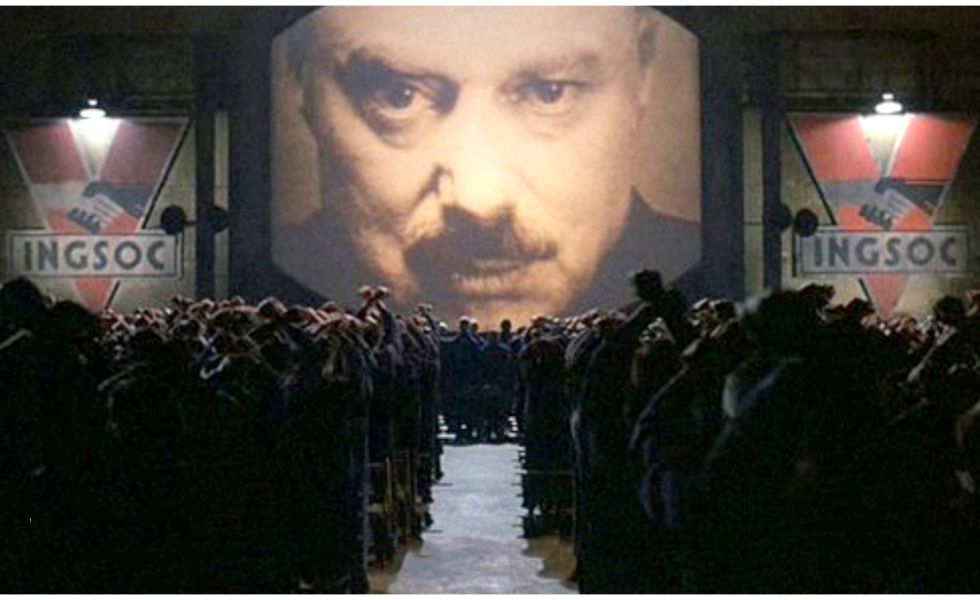
Well, clearly we're into the really big literary villains, and Big Brother is one that seems to get more and more prescient every day. Surveillance, being watched by the government; it was science-fiction when he wrote it, and now, there's probably staring at the screen that I'm typing this on, and that you're reading this on. It's not as well-run as in the book, but... (Shrugs). It's the idea of that person watching you, the idea that the government controls everything and everyone, it's the idea of a symbols replacing a man or a country, a world. There's so many that you can look at and see, "1984" influence, on literature and society today, and most of that comes from the idea and concept of Big Brother. It's a friggin' reality show, and I don't think Orwell, would at all be surprised by that fact.
23. Eve Harrington ("The Wisdom of Eve", 1946)

"All About Eve", the movie has this great conceit, where everybody talks Eve, but we don't get to see or hear her point of view, which makes perfect sense, 'cause Eve Harrington is the perfect villain, only to those who know her. Cause if you did see it from her point of view, she'd be the hero. She's be the one came from nowhere, and fought into the prestigious world of the New York theater and got her chance and got her acclaim and prizes, and now she's famous and off to Hollywood, but it's totally the exact opposite story. It's about this little zealot of a fangirl, who flim-flams her way into the personal life of the stars and ends up stepping on them. I mean, in this industry, of course "All About Eve", relates to us, but there's "All About Eve"'s in nearly every profession. That person who tries to pretend your friend and they admire and how they want to be like you, and eventually they end up taking your spot. Stepping on you, over you, it happens everywhere at some point.
22. Sheriff of Nottingham (English Folklore, date unknown)

The legend of Robin Hood, dates back, at least to the 11th Century, and by most accounts originates in poems or songs of the time. The Sheriff of Nottingham, came later, but of course, he's the kind of villain that just has to exist, because without him, there'd be no Robin Hood. Robin Hood, has to exist, to undermine, the evil all-powerful, single-minded, egotistical, greed-infested dictator that would basically rob from his-eh, constituents, to line his, whatever the equivalent of pocketbooks were at the time. Robin Hood, is the hero that need to make thing right, so there need to be the villain, that's tilting the balance of power in the wrong direction. Plus, it's good sound economics, steal from the rich, give it to the poor. He figured it out back then, they have money, they don't, give them the money to survive. Save Richard the Lionhearted while were at it. Robin Hood is, the great economic morality tale. And of course, it's always somebody with a little power, like a Sheriff, trying to take advantage of a Kingdom being in flux. Big fish, small pond, guys.
21. HAL 9000 ("2001: A Space Odyssey", 1968)
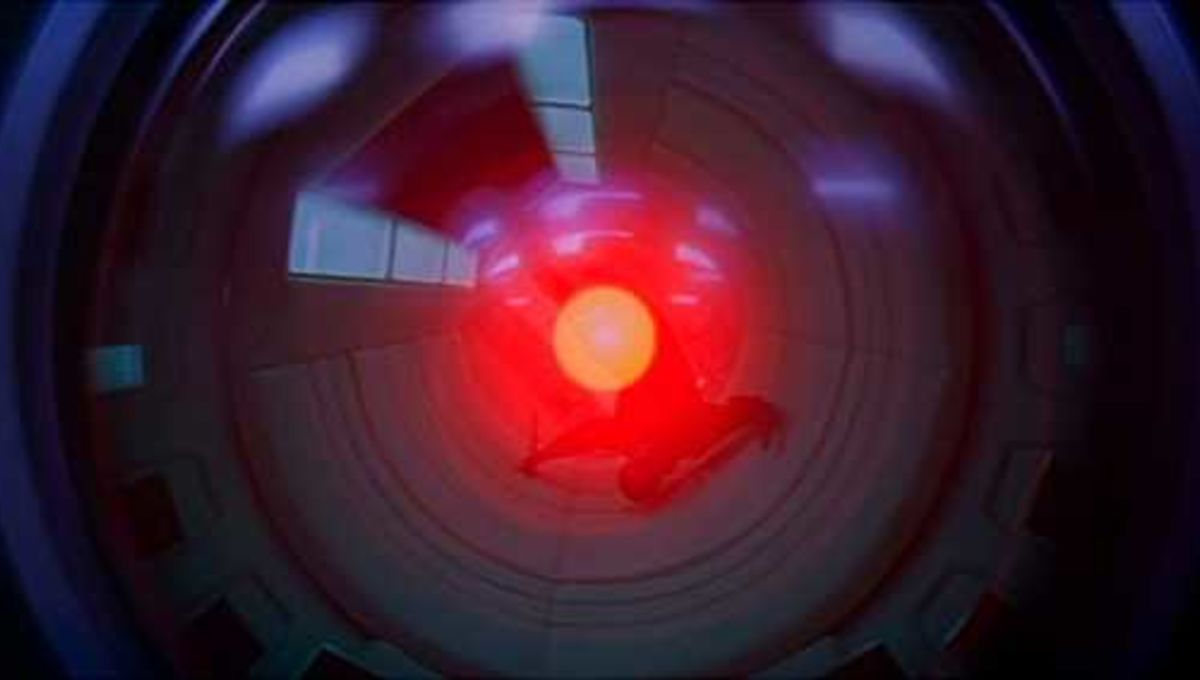
I'm sorry, Dave. So, it's one thing for Big Brother to be watching, it's another for this, computerized void, to be watching you, and then acting on it. HAL 9000 from "2001: A Space Odyssey" is the ultimate, deceit on humanity. We created artificial intelligence and it turns on us, at a time when we needed it more than ever to help protect us. It isn't just that he was a robot who became sapient, he was the zenith of an entire species, when he was created. So, even it's even more devastating than this is in normal, Asimov sci-fi or something, this is equivalent to trying to shoot a gun, and it turned around and shot you in the face. That's the kind of mindfuck that that is.
20. Queen of Hearts ("Alice's Adventures in Wonderland", 1865)

It's a bit difficult to actually differentiate good guy and bad guys in Lewis Carroll's work, because, really what's the difference when you enter Wonderland, but I think "Off with her head" is probably the biggest clue that the Queen of Hearts is the one you really have to stay away from the most. Or at least stay off her bad side. She is, erratic, tempermental, practically schizophrenic in her extremes. Carroll called her "Blind Fury", and yeah, she's just angry and doesn't know where to throw it. It's the perfect example of the out-of-control ruler who just acts on her own whims and you don't want to listen to her, but she's the one in charge, and you just hope that she doesn't change her mind before you finish executing her demands. Everybody in "Alice in Wonderland" is so iconic, and they're dangerous, but she's the one, in charge, so, she's the one going after Alice. She's the one you can't figure out how to control.
19. Javert ("Les Miserables", 1862)
_luces-the-javert.jpg)
It's amazing to me that everybody remembers, that the whole thing started because of a loaf of bread, that's literally like, the part of "Les Miserables" that's least important, but it's the catalyst for Javert, which is the only thing that matters to him. It's almost inhumane, he doesn't seem real. And it goes on and on, and years and years, and this complete lack of sympathy and tunnel-vision from him, just...- it gets under you. He wasted two lives chasing this one man, trying to bring this man back to jail. Javert is what happens to somebody, who doesn't get taught empathy, and the ability to understand somebody else's position. There's a way to be a person of some power, like a prison guard, and still have that, and yet, decades go by, and he doesn't have, never learns it, and just continues to go after this one guy. It's the worst kind of obsession.
18. Alex ("A Clockwork Orange", 1962)
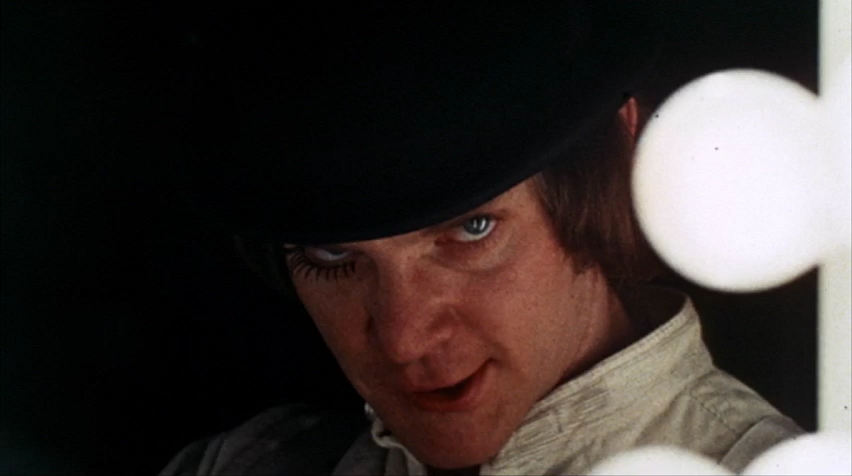
Alex De Large, as he's named in the movie, he's one of those villains, who's really a stand-in for the perils of the society around him. He's evil and villainous, sure, he's a killer, he's a rapist, he's a pedophile, he's a gang leader, there's nothing that's remotely sympathetic about him. But then, he gets the Ludovico and then, supposedly, he's cured, but of course, the treatment, tries to essentially overtake his mind and body, and it's a repressive treatment, and now he's unable to combat and fight. His urges go against him. In the novel, he actually, once he's cured, goes back to being evil and bad for awhile, but he decides to become good, it's actually a positive ending, at least in most versions of the book. In the movie, it suggests that he's better off being this evil excessive sexual deviant, than a society that tries to control and alleviate them. There is also this, growing up parable that insinuates that these childish behaviors we grow out of, but, these aren't,- these aren't simply typical childish teenage behaviors, that's the thing that, makes Alex, so irksome even today. I can't think of "Singin' in the Rain" the same way, I know others who can't either.
17. Charles Foster Kane ("Citizen Kane", 1941)

The tragedy of Charles Foster Kane, is that, he could've been a hero. He wanted to be a hero, or at least, not be the bad guy. but he becomes the villain over time. He becomes the worst kind, the great potential, the great hope, the emotional, rich, brash, yuppie young man, and he can and does change the world, but not in the ways that people hoped or wanted. Most people aren't sad or angry by him, they're mostly just disappointed in him. He could've been so much more and instead he morphed into this grotesque and garish old man, with an empty life surrounded by nobody. Even his last word, he's thinking about what could've been, thinking about the past, a simpler time. Instead, he had an opportunity to run the world, and he did, and most of it, for the worst.
16. C. A. Rotwang ("Metropolis", 1925)

I think people, like to think that the mad scientist trope began with Victor Frankenstein, and technically it did, but the modern version, where that guy is an evil villain, I trace back to Rotwang from "Metropolis". He's the crazed scientist with the mad Tesla-esque laboratory, the missing hand, the infatuation with a woman, it's all there. This is a seminal villain character, which is interesting, 'cause he's not involved in the main conflict in the story. The story is a sci-fi dystopian film, about the labor vs. the wealthy, and the rivalry and struggles between the two understanding how they need each other to survive, the Rotwang character, has a completely different motivation, from everybody else. He's the one who creates the Fake Maria robot that instigates the riots and the rage, but, he's still mostly doing everything, to recreate his dead wife, who's death he blames on the top levels of society. It's difficult to catch, but his act is one of the more destructive in all of literature, how close he comes to taking down a society, just for his own selfish reasons. Ultimately, the great thing is that, like all terrorists who try to divide the people, it ultimately doesn't end up working, and it even brings them closer together. He's a prophetic warning villain as well.
15. Norman Bates ("Psycho", 1959)
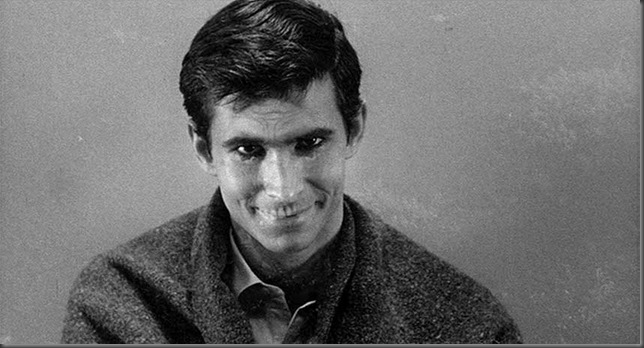
Boy, so many, so many bad villains have been inspired by or just, blatant lifts from Norman Bates, it's mind-boggling to think about really. Pretty much any villain, that's got some kind of mental disorder, or a parent disorder, or the villain as someone, who's not naturally masculine and is somewhat effeminate. "Psycho" probably has influenced more shit than the positive stuff it's created, but that's because of how, shocking and terrifying Norman Bates. It's unexpected, it's a surprise, it's multiple surprises, before we realize, just how crazy this guy is and has been. We're still fascinated with him, we're wondering how he got that way, what about his mother, what about, etc. etc. That's because it's such a startling shock, especially in the film, that, you're caught offguard. And now, you're dealing with a murderer, who's clearly disturbed and brainwashed, but does the mean, he's curable? "He wouldn't even hurt a fly...". Where does psychosis and calculative use of that psychosis begin and end?
14. Nurse Mildred Ratched ("One Flew Over a Cuckoo's Nest", 1962)

Ooh, another big fish, small pond one. Nurse Ratched, is another jarring one, because, it's all about image with her. I think what really catches us offguard with it, is that, we don't really have a basis for women especially, using these tools for the purposes of control and power. We think of women, we think of them, having power over men, by use of sex or sex appeal, or their bodies, or their mind, they're temptresses, their wives, they might be mothers, but if they're a mother in control, they're probably violent, or drunk or have some form of hysteria or something. Nurse Ratched is none of those things. She is always calm, she doesn't raise her voice, she is unsexual, she's scary, she's not dominant like a male character, but she has a passive-aggressiveness to her, that's almost hypnotic. You just fall into her, and presume she knows what best for everyone and is doing what's best for everyone, when in reality, she's manipulating everything. It's all, this disturbing image, this dominant, possessive, soft-voice momism, image, that controls everybody. It's fuck with your mind, 'cause she could use some other tools and skills and techniques, but she used this one, and she got ahead with it, in a male-dominated field. Why did she do that? We don't get an answer and it's so, distraught and disturbing, and the lengths she will go to, to keep control, her control; that's what puts her, so far over the top of others.
13. Walter White ("Breaking Bad", 2008)

Well, there's not much left that can be said about "Breaking Bad". I saw some trying to argue that, he wasn't the villain, are sure there were other probably worst, bigger villains who did worst things, but he was the bad guy, who decided to wipe them out. What's also forgotten, in the transformation from science teacher to drug kingpin is that, he's dying. This is a man, who, you can't kill, 'cause he's already gonna die. There's nothing for him to lose, that's what so frightening about him. The more he comes to terns with his mortality, the stronger he gets, and the less importance and value there is left, for anybody else around him, and therefore the more destructive he becomes.
12. The Wicked Witch of the West ("The Wonderful Wizard of Oz", 1900)

I guess it shouldn't be that surprising to me that the highest-ranked female is a witch, but I guess it is, despite the inevitability of that; witches are pretty much the premiere image of how we've villainized the female gender over the years. I guess it's so iconic, The Wicked Witch of the West; it just fits every cliche and perception that one can think of, involving a witch, especially the big movie. It's interesting, she's only in the first book, of the series, and there's other villains, in the later books, that span across books and are probably more well-developed, but nobody remembers them. Nobody makes more movies and plays and alternate books about them. A lot of it, just might be how vibrant, the film is, especially with that clash of color and black-and-white, that green and black across this, vibrant colorful set, is startling. It is the premiere image of the witch, that we think of, maybe because it's the first one we ever actually clearly saw, collectively.
11. Mr. Edmund Hyde ("Strange Case of Dr. Jekyll and Mr. Hyde", 1886)

Do you think the symbolic value of the Jekyll & Hyde story has held up, 'cause I don't know if it has, which is odd, 'cause it is a powerful one. You know, guy's normal, nice, reasonable, suddenly, he drinks something, and he turns into someone else. I mean, it's not as much science-fiction as people may think. Or horror, really, somehow this story, became more of a horror story these days. I mean, it is the quintessential example of two-facedness. The idea of the villain being the good guy, the idea that there's something dark and mysterious within somebody we know and like, that's taking them over, slowly. There's the scientist, experimenting on himself...., so many things that you can really trace back to Jekyll & Hyde. I mean, he' call it a Jekyll & Hyde dynamic.
Okay, we're at the Top Ten, folks. Whew! Let's count it down, and we're starting with the ultimate example of the good son, who turns into the bad man.
10. Michael Corleone ("The Godfather", 1969)

Being Italian, "The Godfather" obviously has some emotional relevance to me, of course. Michael Corleone, his tragedy is that he wasn't supposed to be the villain. There were others in his family who was supposed to be the villain. He was supposed to be the one became legitimate and good, and of course, things changed and he changed. And before you know what was going on, he slipped into that shoe and it fit comfortably on him, too comfortably. He kills, then he hides, then he comes back and takes over, and becomes the Godfather. He was set up to succeed elsewhere, but who set him to succeed, his family. He thought he was going his own way, but it wasn't, it was always him, reacting to his family, and that's why he so easily and suddenly sulk his way into power, even without really trying, and he spends the rest of his life with that decision, and it does nothing but cost him.
9. Archie Bunker ("All in the Family", 1971)

It does say something about America that, we create a bigot character, and he's still a lovable bigot. We do-, we do love to sanitize things. "All in the Family" is of course Norman Lear's creation, but it was based on a popular British series of the time, which was a sitcom, but it was much harsher, and much more antagonistic than even "All in the Family" was. "All in the Family", was ultimately more two-sided than it seemed. I mean, sure there's some out there, who probably skipped over the satire, and completely missed that stuff altogether, and thought he was the hero, but ultimately, the show, was about a guy, who, was going through the rough process of figuring out that he and some of his previous thoughts and views, were a bit misguided. He's not aware of how hypocritical he is, or how racist or sexist or homophobic he is, but you know, slowly but surely, these things, they start to peel away from him. Not entirely, of course, it never will entirely, that's why on this list, but it does depict him, as human. That, in most circumstances, with a villain like him, is a bad thing, but the fact is, there are Archie Bunker's out there and they are human. And if we aren't Archie Bunker, those thought can cross our minds too for a minute, and we have to learn to, disregard those learned instinctual ideas and thoughts. He is the representative of that, and probably always will be.
I thought for a little while on who actually is the top villain in the world of fairy tales, and there are plenty of great villains, a few made the list, but the more I thought about it, there's one character who I genuinely cannot imagine a positive spin on, and I honestly can't think of one either. Well, maybe one, and that's combining him with several other characters.
8. Rumpelstiltskin (German folklore, "Rumpelstiltskin", 1812)

Let's go down the list, he's a huckster, he's essentially a loan shark, or I love the twist in "Once Upon a Time" where he's a pawnbroker, that's a perfect profession for this character. He's a crook, he's magical, in some way that we never find out. Oh, he's an alchemist, there's that! Let's not bury that lead, he turns straw into gold! There's certain literary professions you don't trust, fortune tellers, tarot readers..., alchemists is up there. What's so frustrating about Rumpelstiltskin, is the complete lack of motivation. We don't know where he comes from, why he's making this deal, with this young Miller's daughter, and, why does he want this kid!? That's what so frustrating about him. He's the devil. He's kinda worst than the Devil, I don't think the Devil would make that deal; the devil wants your soul, I don't think he wants your unborn child. Every other villain, you at least, know what they're trying to do and why, even in fairy tales, Rumpelstiltskin... um...? I don't think he wants the kid, I think he just wants to be able to say that, you owe me. Wants to be the guy who, literally owns you. That's what puts him over-the-top for me.
7. John Ross "J.R." Ewing, Jr. ("Dallas", 1978)

Well, just on the fact that he gets shot and literally everybody has a motive for doing it, you're probably a villain. J.R. Ewing, one of the fascination characters in television history, and easily one of the medium's greatest villain. The slick oilman, the son of the great oilman, he's entitled, he's a hypocrite, he's a manipulator of people. He's always trying to con, and find an angle; it doesn't even occur to him that something's genuine. He just presumes you're trying to run an angle and he assumes that there's an angle to run. He assumes there's a way for him to angle it, to get at you. He only strives to intimidate and manipulate. He's a cheater; he's a thief, he believes he can buy you out. Even his mother told him that there are absolutely no positive traits to him. And there, really aren't any. Psychologically, it's fascination honestly, you just wonder, how and why his mind works like this. He wasn't raised that way, the rest of his family's nice; they got problems, but they're nice. He just thinks and reacts that way. He's always involved, if he's involved there's something below board about it, and it's probably his fault, something he did that started it, and then he tries to buy his way out of it, and place the blame on someone else, or pay someone to take the blame....- There's no end to the bullshit with J.R. Ewing. He ruins everyone around him, however he can. If it's through your head, it's through your mind, if it's through your pocketbook, it's through your pocketbook, it doesn't matter it is, as long as he finds the vulnerable spot, he will then exploit it, 'cause that's all he knows how to do.
6. Dr. Hannibal Lecter ("Red Dragon", 1981)

A lot of what makes Dr. Lecter, so fascinating is just his presence. He's not, your typical serial killer, in fact, that's why you go to him, to find other serial killers, 'cause he is superior. He's smarter than they are, he's an intellectual, he's a psychiatrist, so again, somebody who dives into the mind. And then, if that doesn't satisfy him, presumably into the body. He's a character that you're just naturally fascinated and enticed by. He's brilliant, he's sophisticated, fava beans and chianti, he prepares a meal, a nice meal! Think about that. It's almost surrealism, his existence; you'd think he'd be a throwaway joke in a Bunuel movie, but no, he's more complex than that. And it's annoying, that we don't, or we didn't really dive into his past, until recently, which again, I think was a bad idea. We can seek out our flaws and past, it's almost cheating to really dive in and find out, "How did he become a cannibal; why does he insist on doing that?" No answer would be satisfactory and it's much more interesting to let him, play his game on us, than it is, to our game on him, which, frankly, wouldn't work anyway. Never has an insert shot of one hand touching another, felt so creepy. It's not that he simply shouldn't exist, he shouldn't exist, and he shouldn't be this much better at it than the police are, then we are, that's what, so terrifying about him.
One thing I found out while doing this list is that, villains, typically aren't as interesting as heroes are. You'd think it'd be the other way around, but when you think about, you're usually following the hero, and you develop him over time and usually, you're establish this hero and so amazing and dominant, and to do that, you have to create villains who by nature, aren't as compelling or strong. The heroes are often, so dominant, that if seems like nothing and no one can defeat them. So, when you're in that position, how do you create a villain who can?
5. Professor Moriarty ("The Adventure of the Final Problem", 1893)

Professor Moriarty doesn't actually show up in as many Sherlock Holmes stories as people think. Hell, there's other Sherlock villains I tend to prefer, Irene Adler's one of my favorites for instance. But Moriarty, is the one everyone remember and builds the mythology around. The one that, over a century later, everyone thinks about as Sherlock's greatest rival. He was designed specifically as a way to kill Sherlock Holmes, that was his intent, and hesucceeded, or it seemed at least, until he came back to life anyway, but that's his design. To be an opposite, equivalent to Sherlock Holmes, who at the time, and arguably now, is the greatest and most powerful of all heroic literary characters. So, you have to create the villain version of him, in order to make his death, remotely believable. That's the great achievement of Moriarty as a character, he is the opposite of the hero character. The direct opposite in fact. That dichotomy, that duality. The compelling villain, that exists, because he is up against the strongest and most compelling hero.
Okay, so I have, one extra character who's technically a real-life person; but, no, I don't think I have to worry about this one. The real-life person and the character we all know, are so vastly different that I don't think I'm in much trouble on this one. Besides, it's the Bard.
4. Richard III ("Richard III," 1591?)

The First big thing you notice about Richard III, is that he's the narrator for his story. He introduces himself to us, the audience, as the villain, and he then, we see him, truly become the villain. "Richard III", is like the original "House of Cards", it's this maniacal political drama, and it's focused on this character who's power-hungry, and systematically goes through everybody ahead of him, in order to achieve the throne. He would conniving, he would manipulate, he would lie, more than that, he would just kill. He was just manipulating everybody around him. And of course, it's a first-person narrative, so we're in on this. We're in the conspiracy; he's one of the first big villain protagonists, and we're cheering for him, as he lies and bullshits his way through everything. We see how he coerces everything; it's unclear how many people suspect what he's doing, or know how to stop it, and of course, at that point, you can't pretty much. It's idea of power behind the throne, and then the power overtaking the throne, and he's sorta both, and of course, he's not King for long, as eventually he's in the middle of a war and he's begging his country for a horse, which, means something when you're a King, and you've done everything underhanded possible to become King. Everybody's abandoned him, and now he's alone.
Technically, J.R. Ewing is the highest-ranked character on my ballot who originated from television, since my number three choice, originated in a couple short films, but either way, I think most people might be shocked at how high I've ranked him, but really? Is it that shocking?
3. Eric Cartman ("Jesus vs. Santa", 1995)

I know Parker & Stone consider Eric Cartman a little Archie Bunker, but really, he's Archie Bunker, if he wasn't capable of understanding and learning, and empathy. Cartman, is just evil. He's sociopathic, he's psychopathic. He's a racist, he's a sexist, he's a bigot, he's a spoiled brat,.... I mean, how many, amoral, despicable things has he done, or has he tried to do over the years? All of them, for the most selfish of reasons. There is nothing, off-limits for Eric Cartman, he will do it to humiliate and destroy others, and he'll do it, just to piss you off. Just to show that he can. He's greedy, he wants to get rich quick, 'cause with money, he can control. Yeah, he's a fat ten-year-old, but he just does and says exactly the thing that will get under your skin. It's been twenty years of this now, and it ain't stopping. Whatever stupid point he's trying to make, he will cause World War III and IV to prove it. He is that ten-year-old asshole who demands that you "respect his authority", as though he has any. And if you don't, he'll make you eat your parents, or suck his balls, or, whatever it is, he'll just hover it over you. He is capable of doing anything and everything and that makes him a terrifying villain.
2, Count Dracula ("Dracula", 1897)

Quick, name a famous vampire? You said, Count Dracula, 'cause he's the vampire. There's basically two camps on how to analyze vampire literature, it's either, does it use the characteristic and traits of "Dracula", or does it alter or change from them, that's how big Count Dracula is. Forget the original context of Dracula, who remembers, who cares? Dracula, is the kind of villain, you can basically throw anywhere, and nobody would really question it too much. He can morph into whoever and however you want him too. He can be the sexual predator, he can be the creepy monster that goes after Abbott & Costello, he can be, the concerned father of the a teenage vampire, apparently. Everything vampire-related revolves around Dracula. The cape, the fangs, the garlic fear, the light fear, the turning into a bat, it's pretty, an entire genre and subgenre, that revolves and react to the influence of this one character Bram Stoker created.
So, when I started composing this ballot, I genuinely didn't have any idea who I would put at number one, or why, or for that matter, anybody else on this list. Sure, I can name a thousand or so villains off the top of my head, but which one is the top villain, of all of them? How do you figure this out? This is again, why I decided to zone in on, the literary aspects of importance of the characters, since there was no limitations with that, all literature is eligible so, that's where I looked. And when I did that, I also thought a great deal about literature in general. And, there's a lot to think about, but it's also much more easy to break down than people realize. There's only four or five major conflicts, and dramas, and basically 14 or 15 major story arc and plot, and everything else is a variations; I'm sure I'm getting the numbers wrong, but basically that's all there is, and most of those stories, in some way, shaped or form can basically be traced back, in Modern Western Literature, to Shakespeare. Every romantic-comedy is "Much Ado About Nothing", every trapped characters story is "The Tempest", etc. etc., there's something that you can go back to in Shakespeare.
Except one, there's one major narrative that Shakespeare didn't originate or master. And it's a big one, a really big narrative, that Shakespeare didn't do. It was actually his contemporary, Christopher Marlowe who tackled it, and brought the trope into modern western literature. The villain of that piece of literature, is my number one.
1. Mephistopheles (German folklore, "The Tragic History of Doctor Faustus", 1587)

The deal with the devil; it has to be Mephistopheles number one. The Faustian narrative, dates back to German folklore, and there were several writings and allusions to it beforehand, but Marlowe's adaptation is the one that solidified it as a narrative. The narrative, is pretty basic, essentially. You get your Faust character, and he is tempted by a Mephistopheles character, who is promised to rise up in society and in the world, and for one reason or another, he makes the deal, regular life isn't great, so he goes after something else, and of course, what happens is that, he gets all he wants, and then, finally, he loses everything else that he had. We're not all Jesus, some of us, give into temptation, but it's not always temptation strangely enough. It's often, boredom that leads to people to make the deal, it's often, desire that makes people make the deal, sometimes it's, the fact that you got nothing to lose, or you think you do. Most of this narrative, actually is about how the Faust character, becomes a villain, that's how the focus is shifted. The reason Mephastopheles is number one, because, if you look at the list of characters, this Top 100 and beyond, and just how many, really big villain characters, are basically following the Faust model, the Faust narrative arc. Walter White, Michael Corleone, Charles Foster Kane, Richard III to some extent even. The big change that turns a character, into a villain, it's that moment, that makes Mephistopheles, more than just the Devil, he's the character that most represents the turn to evil. He's the moment, a character goes from good to bad. Sometimes, he's literal, sometimes, it's figurative, sometimes, the story doesn't have a character like him, but the Faust narrative, remains and continues on; it's one of the most compelling narratives there is. You get everything you wanted, and then you're damned for it. And Mephistopheles, is one who damns them.
Well, that's my ballot. Keep and eye out on The Geekcast Radio Network for when they reveal the results of their poll. What did you think, agree/disagree? Let me know. Alright, I'm like behind on everything else, so, now I gotta get to work.
No comments:
Post a Comment